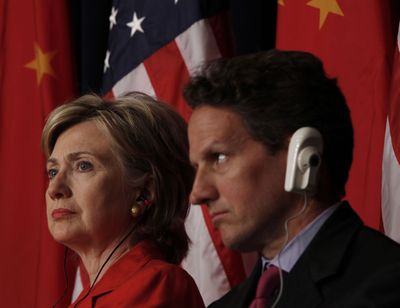U.S., China vow to help stabilize global economy

WASHINGTON – The United States and China pledged Tuesday to lay a foundation for a global economic recovery by pursuing policies aimed at easing their massive trade imbalance and improving regulation of the financial system.
The commitments by the two major engines of the global economy came at the end of two days of high-level discussions in Washington that covered a broad range of topics besides the global recession, including North Korea, nuclear proliferation and climate change.
The talks, co-chaired by Treasury Secretary Timothy Geithner and Secretary of State Hillary Rodham Clinton, produced little in the way of substantive agreements. Instead, officials from both countries outlined common concerns that they said they would continue to address: the trade imbalance, financial regulatory reform, protectionism and climate change. They also said they would work to reform the governance of the International Monetary Fund and the World Bank to better reflect China’s status as the world’s third-largest economy.
In closing statements, Geithner called cooperation between the United States and China “vital not only to the well-being of our two nations but also the health of the global economy.”
Geithner assembled a team of senior U.S. economic officials for the meetings, including Federal Reserve Chairman Ben Bernanke and White House economic adviser Lawrence Summers, in part to reassure the Chinese about the safety of their U.S. investments.
Last fall, China replaced Japan as the United States’ No. 1 foreign creditor; it now holds roughly $1 out of every $10 in U.S. public debt.
On the political front, Clinton on Tuesday said her discussions on North Korea’s nuclear program, Iran’s nuclear program and climate change were the most productive.
Officials from China and the United States signed a memorandum of understanding reaffirming their commitment to cooperation on climate change without agreeing to specific emissions targets. The agreement was yet another step in slow-moving negotiations seen as vital to the effort to produce a global pact on greenhouse gases.